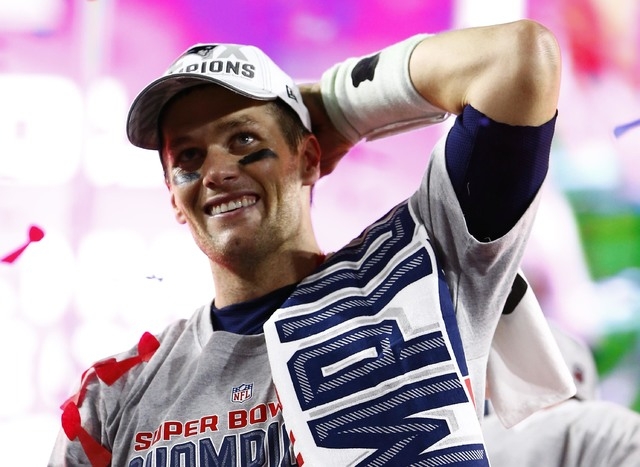Thin line between hero and goat
GLENDALE, Ariz. — It is true that the thin margin between legacy and failure can hinge on one moment, one decision, one snap of a football. Luck might be what happens when preparation meets opportunity, but the idea that champions make their own breaks remains accurate.
Sometimes, however, you get a little help on your way to immortality.
The closeness and theatrics and excitement that most predicted would define Super Bowl XLIX more than transpired at University of Phoenix Stadium on Sunday night, but the fact New England today owns a fourth Lombardi Trophy is as much about its opponent’s ineptitude as its own resilience.
The Patriots beat Seattle 28-24 before 70,288 and a global television audience that was likely unified in its bewilderment about Seattle’s play-calling in the final seconds as anyone in attendance.
One moment.
One decision.
One snap of a football.
The difference between legacy and failure, between greatness and goats.
That the Seahawks called for a pass on second-and-goal from the 1-yard line with 26 seconds remaining, in possession of a timeout and the incredibly powerful and talented Marshawn Lynch in the backfield, likely not only denied them a second consecutive Super Bowl title, but in turn caused a domino effect of storied significance.
It will be regarded over time as one of the biggest plays in Super Bowl history.
It absolutely should be viewed as the worst play call.
Ever.
Russell Wilson’s pass was intercepted by rookie defensive back Malcolm Butler at the goal line and time changed forever, allowing Tom Brady to win a fourth Super Bowl and placing him alongside boyhood hero Joe Montana and Terry Bradshaw as the only quarterbacks to own such a distinction.
“I told the guys in the locker room that they were on the precipice of winning a championship,” Seattle coach Pete Carroll said. “Unfortunately, the play goes the other way. There is nobody to blame but me. I don’t want them to think anything other than that. You can ask all you want. I’ll tell you again if you want to hear again. We were going to run the ball to win that game, but not on that down. That’s it.”
But it’s so much more. Lynch had run for a 4-yard gain on first down and the idea that any defense would stop him from a yard out with three downs to work with, a player who scored 17 touchdowns in the regular season and had already found the end zone earlier in the evening, was borderline absurd.
The Patriots had not used one of their two remaining timeouts after first down, signaling that they were playing the thing out, intent to live-and-die with the idea of a championship being dependant on stopping Lynch.
They never faced such a test.
A thin margin, is right.
Seattle didn’t run and, all of a sudden, Jermaine Kearse’s thrilling 33-yard reception on his back that gave the Seahawks first-and-goal from the 5 with 1:06 left meant nothing. For a blink, the Patriots were re-living the nightmare that was David Tyree of the Giants— Super Bowl XLII, same stadium, same massive swing in momentum, same sort of improbable reception, same potential for disaster.
Seattle didn’t run and the feel-good story of Chris Matthews disappeared, of the wide receiver who had never caught an NFL pass before Sunday having four receptions for 109 yards and a score, the guy who once dropped off a junior-college highlight tape to Carroll’s house in hopes of being recruited to Southern California and never hearing back, who almost skipped his free-agent tryout with the Seahawks because it would have interfered with his job at Foot Locker.
Seattle didn’t run and Brady went from a guy who would have been 3-3 in Super Bowls and whose place among the all-time greats would have undoubtedly been lowered after throwing two key interceptions to a quarterback many will consider today the greatest to ever play. No one has thrown more Super Bowl touchdowns than him now. You can’t imagine how more impressive four rings sounds than three when debating history’s best.
Seattle didn’t run and the lives of everyone intimately involved with this Super Bowl simultaneously changed for better or worse.
“I’m a little surprised we (didn’t run),” Seattle cornerback Richard Sherman said. “It was an unfortunate play. What I would have done is irrelevant. We went with that play. We trusted our quarterback and they made a play.”
The movie reel turns and images become clear, from Marcus Allen cutting back against the Redskins and Lynn Swann majestically grabbing the ball in flight against the Cowboys and James Harrison rumbling 100 yards against the Cardinals and, of course, Tyree’s helmet helping to clutch his magnificent catch.
Super Bowls are defined by players and, mostly, those plays they execute in the most critical of times, which makes XLIX all the more astonishing on how its conclusion was written. The one play that could have defined this game more than anything was never called. The biggest star on the field at the time was never allowed to shine.
For nearly 60 minutes, the closeness and theatrics and excitement that most predicted for this matchup played out to perfection. It was everything we wanted and expected.
And then Seattle faced second-and-goal from the 1 with a timeout remaining, Lynch in the backfield and New England intent on playing it out.
“I made it,” Carroll said. “I made the decision. I said, ‘Throw it.’”
By doing so, history changed.
The difference between legacy and failure, between greatness and goats.
One moment.
One snap of a football.
Las Vegas Review-Journal sports columnist Ed Graney can be reached at egraney@reviewjournal.com or 702-383-4618. He can be heard from 11 a.m. to 2 p.m. Monday through Friday on “Gridlock,” ESPN 1100 and 100.9 FM. Follow him on Twitter: @edgraney.




















